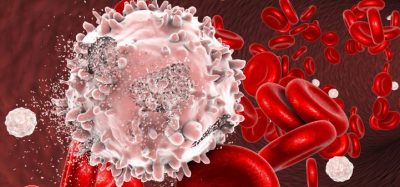Targeted cancer vaccines eliminate tumours and prevent recurrence in mice
Posted: 16 August 2022 | Ria Kakkad (Drug Target Review) | No comments yet
Researchers have developed an mRNA-based cancer vaccine that is delivered directly into the lymphatic system for a more potent response.

Researchers from the Tufts School of Engineering, US have developed a method of targeting cancer in mice with an efficient vaccine that eliminates tumours and prevents their recurrence. The findings were recently published in Proceedings of the National Academy of Sciences.
The developed cancer vaccine delivers mRNA in tiny lipid bubbles that ultimately fuse with cells in the body. The mRNA codes for antigens found in cancer cells and the lipid nanoparticles can target the lymphatic system so that the response is significantly more potent.
“What we are doing now is developing the next generation of mRNA vaccines using lipid nanoparticle delivery technology, with the ability to target specific organs and tissues,” explained Professor Qiaobing Xu. “Targeting the lymphatic system helped us to overcome many of the challenges that have faced others in developing a cancer vaccine.”
The team had previously designed lipid nanoparticles (LNPs) that targeted gene editing packages to the brain and liver, as well as gene therapy to the lungs to reverse a genetic condition in a mouse model. Targeting is achieved by modifying the chemical structure of the lipids that make up the bubbles as well as other additives until the researchers find a combination that prefers to go to the organ of interest. In this case, they found an LNP that concentrated in the lymph nodes after they were injected subcutaneously into mice. The researchers think the LNPs collect molecules from the blood stream on their surface, and those selected molecules bind to specific receptors in the target organ.
With more vaccine going to the lymph nodes, the researchers discovered that the cancer vaccine was absorbed by about a third of the dendritic cells and macrophages, creating a more potent response against tumours carrying the same antigen found in the vaccine.
Mice with metastatic melanoma that were treated with the lymph-targeted vaccine showed significant inhibition of tumours and a 40 percent rate of complete response with no tumours and no recurrence in the long-term when it was combined with another existing therapy that helps prevent cancer cells from suppressing an immune response.
All the mice that were in complete remission prevented any new tumours from forming when injected later with metastatic tumour cells, showing that the cancer vaccine led to excellent immune memory.
“Cancer vaccines have always been a challenge because tumour antigens do not always look so ‘foreign’ like antigens on viruses and bacteria, and the tumours can actively inhibit the immune response,” said Jinjin Chen, a postdoctoral research fellow at Tufts University who is part of the the research team. “This cancer vaccine evokes a much stronger response and is capable of carrying mRNA for both large and small antigens. We are hoping that it could become a universal platform not only for cancer vaccines, but also for more effective vaccines against viruses and other pathogens.”
Related conditions
Metastatic melanoma
Related organisations
Tufts School of Engineering
Related people
Jinjin Chen, Professor Qiaobing Xu






